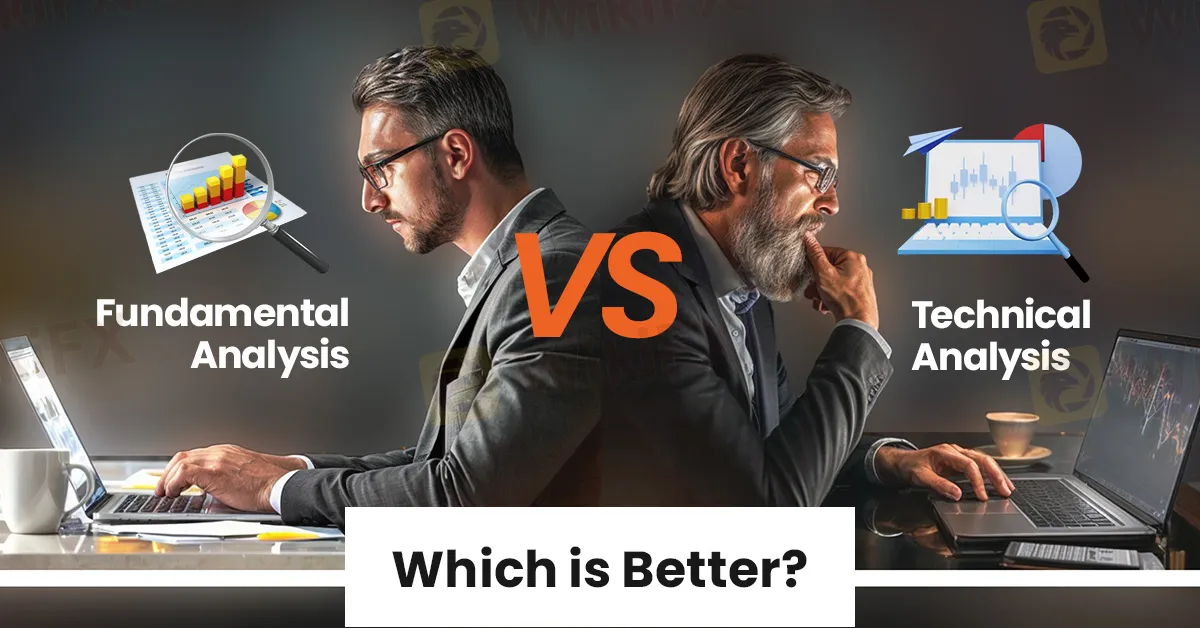简体中文
繁體中文
English
Pусский
日本語
ภาษาไทย
Tiếng Việt
Bahasa Indonesia
Español
हिन्दी
Filippiiniläinen
Français
Deutsch
Português
Türkçe
한국어
العربية
Fundamental VS Technical Analysis - Which is Better?
Abstract:Discover the ultimate trading secret: the battle between fundamental and technical analysis unveiled.

In the world of forex and cryptocurrency trading, there exists an ongoing debate between two major schools of thought: fundamental analysis and technical analysis. Both methodologies offer unique perspectives on market behaviour and can be powerful tools in the hands of skilled traders. However, the question remains: which approach is better?
Fundamental analysis revolves around the examination of economic, social, and political factors that may influence the value of a currency or cryptocurrency. This includes assessing factors such as interest rates, inflation, geopolitical events, and economic indicators like GDP growth and employment figures. Proponents of fundamental analysis argue that these fundamental factors ultimately drive long-term trends in the market.
On the other hand, technical analysis focuses on the study of historical price and volume data to identify patterns and trends. Technical analysts use tools such as charts, trendlines, and indicators like moving averages and relative strength index (RSI) to make trading decisions. They believe that past price movements can provide insights into future price action and market sentiment.
So, which approach is better?

The truth is, there is no one-size-fits-all answer. Both fundamental and technical analysis have their strengths and weaknesses, and successful traders often use a combination of both methodologies to inform their decisions.
Fundamental analysis is particularly useful for long-term investors who are interested in understanding the underlying value of an asset. For example, in the forex market, central bank policies and economic data releases can have a significant impact on currency valuations over time. Similarly, in the cryptocurrency market, developments such as regulatory changes or technological advancements can drive long-term price trends.
However, fundamental analysis may not always be timely in a fast-moving market. Economic data releases can be unpredictable, and their impact on the market may be delayed or muted by other factors. Moreover, fundamental analysis can sometimes be subjective, as different analysts may interpret the same data differently.
On the other hand, technical analysis excels in identifying short-term trading opportunities and timing market entries and exits. Technical indicators can help traders spot trends, reversals, and support and resistance levels, allowing them to make informed decisions based on price action. Technical analysis also tends to be more objective, as price data is readily available and can be analysed using standardized tools and techniques.
However, critics argue that technical analysis alone may not provide a complete picture of market dynamics. Price movements are influenced by a wide range of factors, and technical indicators can sometimes generate false signals or fail in volatile market conditions.
Ultimately, the effectiveness of fundamental versus technical analysis depends on the individual trader's preferences, time horizon, and risk tolerance. Some traders may prefer to focus exclusively on one approach, while others may use a combination of both. Whichever path you choose, it's essential to continuously educate yourself, adapt to changing market conditions, and practice proper risk management techniques. After all, successful trading is not about finding the “better” approach but rather about finding what works best for you.

Disclaimer:
The views in this article only represent the author's personal views, and do not constitute investment advice on this platform. This platform does not guarantee the accuracy, completeness and timeliness of the information in the article, and will not be liable for any loss caused by the use of or reliance on the information in the article.
Read more

The Funded Trader: Reactivates Accounts with Revised Payout Structure
Proprietary trading firm The Funded Trader has detailed its financial recovery efforts following a turbulent period marked by an unsustainable payout model. Addressing these challenges publicly, the firm outlined the steps being taken to resolve outstanding obligations and ensure operational sustainability.

Doo Group Broadens Global Footprint with Indonesian Broker Acquisition
Doo Group has announced its acquisition of PT Prima Tangguharta Futures, a Jakarta-based broker specialising in online derivatives trading. This move represents a significant step in Doo Group's regional expansion strategy and reinforces its growing presence in Southeast Asia.

Webull Partners with Coinbase to Offer Crypto Futures
Webull partners with Coinbase Derivatives to offer crypto futures, providing US investors access to Bitcoin and Ethereum contracts with lower entry barriers.

eToro Expands Nationwide Access with New York Launch
eToro launches in New York, offering fractional stock, ETF, and options trading nationwide. Discover innovative features like copy trading and free education.
WikiFX Broker
Latest News
Webull Partners with Coinbase to Offer Crypto Futures
eToro Expands Nationwide Access with New York Launch
GCash, Government to Launch GBonds for Easy Investments
Why Is UK Inflation Rising Again Despite Recent Lows?
Interactive Brokers Launches Tax-Friendly PEA Accounts in France
Find Regulated Brokers from A to Z on WikiFX
Countdown to WikiEXPO Dubai 2024 — “Seeing Diversity, Trading Safely”
Former Director Sentenced for Share Disclosure Breach
PayPal Expands PYUSD Use for Seamless Cross-Border Transfers
Trump Media in Talks to Acquire Crypto Firm Bakkt
Currency Calculator


